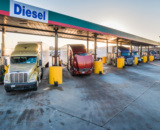Announcements by Visa, followed by MasterCard and American Express come in response to growing outrage from retailers, but remain insufficient.
Recognizing the growing and unacceptable problem with chargebacks, Visa has announced modifications to EMV certification and chargeback requirements, and shortly thereafter MasterCard and American Express followed suit. These announcements undoubtedly came in response to growing pressure from retailers and their advocates that the EMV liability shift has resulted in an excessive and unfair increase in chargebacks that retailers have absorbed, often with no viable method for avoiding them.
Dozens of NATSO members alerted their Senators and Congressmen about this problem in May during NATSO's annual Day on the Hill. The recent changes are undoubtedly preferable to the status quo but do not addressed the fundamental, systemic flaws with the current chip-and-signature approach. At its Day on the Hill, NATSO members advocated use of a chip-and-PIN to effectively minimize fraud and chargebacks.
As part of its recent announcement, Visa is now allowing all acquiring banks to self-certify their EMV solutions. This eliminates the need for acquirers to submit test results to Visa. Many NATSO members and other retailers are in a position where they have invested in EMV equipment but still exposed to liability because it takes so long to get that equipment formally "certified."
Visa also announced that effective July 22, 2016, there will be a $25 minimum limit for chargebacks on U.S. domestic card-present transactions. Additionally, effective October 2016, a maximum of 10 counterfeit fraud chargebacks will be allowed per account in a 120-day period for U.S. domestic card-present transactions.
For its part, MasterCard also announced changes to its EMV terminal testing and certification program to expedite the certification process by allowing acquiring banks to elect alternative testing procedures and reducing the minimum number of tests.
American Express has announced changes similar to Visa, i.e., that it would not initiate chargebacks for transactions of less than $25 and would limit the number of chargebacks to 10 per account by the end of the year.
Although these changes -- which is generally in effect until April 2018 -- will help NATSO members, retailers will not be reimbursed for the money they have already spent on chargebacks and EMV equipment. Indeed, while this may offer some relief in the future, it doesn't help the many travel plaza operators who have been waiting to get certified for months.
Subscribe to Updates
NATSO provides a breadth of information created to strengthen travel plazas’ ability to meet the needs of the travelling public in an age of disruption. This includes knowledge filled blog posts, articles and publications. If you would like to receive a digest of blog post and articles directly in your inbox, please provide your name, email and the frequency of the updates you want to receive the email digest.

